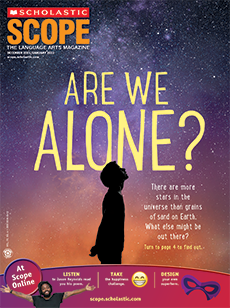The narrative nonfiction feature in the September issue of Scope tells the powerful story of Bilan, a 15-year-old refugee from Somalia who is growing up in a refugee camp in Ethiopia. This article will build important knowledge about the global refugee crisis, what refugee camps are and why they exist, and how the international community can come together to help refugees find a path forward. After reading the article, explore the resources below to keep the learning going.
Guiding Questions:
Post these questions in your classroom for students to refer to and discuss as they explore the resources:
- What forces people to leave their homelands?
- What challenges do refugees face?
- What is the responsibility of the global community to help people in crisis?
- What can we do to help refugees?








